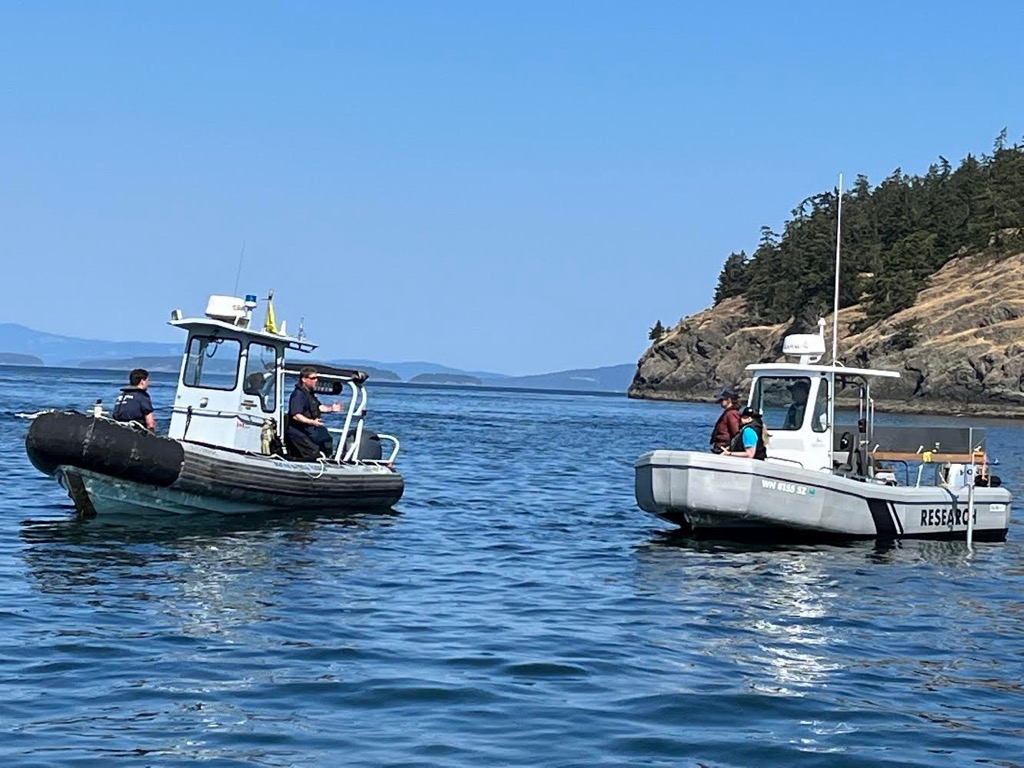
Wildlife vessels on the water near San Juan Island during a spill response, Sept. 2020. NOAA photo
Every day, thousands of gallons of oil or other hazardous materials are transported by vessels, railroads, facilities and pipelines across Washington state. Any time oil is moved, there is a risk of a spill, so planning and preparedness is essential to reduce potential impacts to land, water, wildlife, and the state’s economy.
History has shown us that when large spills happens, the affected community is eager to help. By pre-registering at Oil Spills 101, you and your vessel will be placed on a list of volunteers eligible to assist during oil spill responses.
Can we count on VOO to lend a hand?
In spill lingo, a VOO is a Vessel of Opportunity, which is a local, commercial or recreational boat operated by someone that has volunteered to assist in responding to oil spills. Types of vessels that have historically participated in spills as a VOO include:
- Fishing boats.
- Charter boats.
- Deck barges.
- Other smaller work boats.
Ecology manages a VOO program that brings volunteers into the fold of tackling a spill.
“Even though we have a lot of resources in place, like pre-staged equipment and personnel, we can always supplement those resources. Local people with local knowledge are invaluable to spill response efforts,” said Preparedness Section Manager, Matt Bissell. “The local area means everything to the people that live there. In the event of an emergency, we all want to protect the waters we love, and we want to harness every local resource available to help do that.”
Vessel owners who volunteer to be a VOO will supplement the system of organized, professional spill responders already in place throughout the state. But not all boats will be directly involved with oiled waters. Vessels of all types and sizes are typically needed for things like:
- Moving equipment.
- Delivering food.
- Assisting with wildlife rehabilitation.
How can I sign up?
Sign up to become a VOO at Oil Spills 101. Ecology’s Spills Program will collect the information as well as other groups, like response contractors or oil companies, that will reach out to find vessel owners they can contract with. Vessel owners will be trained, assigned to a duty, and paid for occasional, part-time work.
Signing up now is important because when spills occur, having a roster of volunteers ahead of time makes it easier than trying to sign people up during an emergency.
“We know there are people out there who want to help the affected area recover faster and heal a community that may be impacted by such a disastrous event. We deeply appreciate the assistance and encourage anyone who may want to help to sign up,” said Bissell.
Ecology’s efforts to boost the VOO program comes from Governor Jay Inslee’s Executive Order 18-02, pertaining to the Southern Resident Killer Whale Recovery and Task Force. In that order, he directed Ecology to develop a curriculum to improve and increase the number of trainings for vessels in the whale watching industry to become a VOO and assist during a spill.
Volunteers learn about boom deployment at a drill in 2019.
Don’t have a boat? We still need your help!
There are many needs during a large spill and often not enough hands to deal with them all. The Oil Spills 101 site also accepts anyone who wants to be a general volunteer during a spill incident. One important reminder is that many people want to help during a spill, but should not do so unless they are an official part of the response and under the direction of the incident command.
“The last thing we need are good-intentioned people trying to help a response on their own, but they end up actually interfering with the response or getting injured. Anyone who is interested in helping, please do so under the formal direction from the response effort, which means signing up through the proper channels ahead of time,” said Bissell.
Questions? Reach out to Shawn Zaniewski at shawn.zaniewski@ecy.wa.gov, or 360-951-1668.


